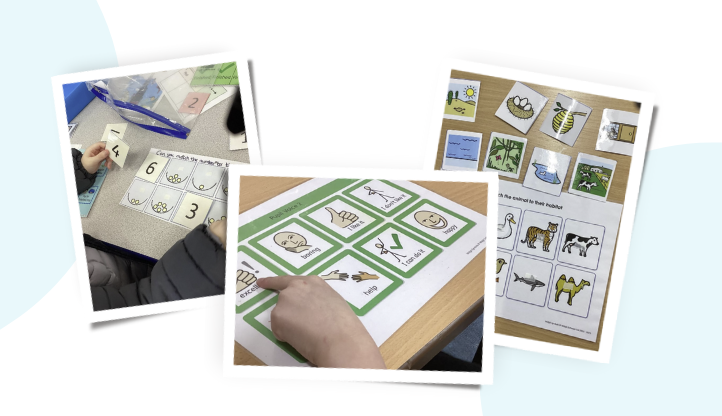- You are here:
- Home
- Success Stories
- How Woodbridge SEND Service champions inclusive learning with Widgit
How Woodbridge SEND Service champions inclusive learning with Widgit
Building understanding and confidence with symbol-supported communication


When Rachel Berry talks about communication, her enthusiasm is inspiring. As a teacher and outreach specialist at the Woodbridge SEND Service in Bolton, she’s seen first-hand how the right tools can unlock understanding for children who might otherwise struggle to be heard.


“We always say,” Rachel starts, “it’s not ‘challenging behaviour’, it’s ‘unskilled communication’. Children are telling us something using the best tools they’ve got at the time. Our job is to give them better tools.” And one of those tools is Widgit.
The Woodbridge SEND Service is part of the Woodbridge Trust, a family of specialist schools and a college in Bolton. The service itself is something of a rarity in the UK: a 30-strong team of teachers and teaching assistants who work full time supporting mainstream schools across the area.
Their mission? To help staff build the knowledge and confidence to support children with additional needs.
From private nurseries to colleges, the team’s reach spans the entire education journey. “We go into every setting in Bolton,” Rachel explains. “That’s 2-year-olds right up to young people in further education. We also sit on NHS panels for autism assessments and support diagnosis pathways. It’s broad, but that’s what makes it so rewarding.”
Discovering Widgit: a game-changer for communication
The team’s journey with Widgit began several years ago, after one of their teaching assistants first introduced the software.
“It was template-driven and so intuitive that schools just loved it. We started recommending it everywhere, and before long, nearly every primary school in Bolton was using it.”
The impact has been remarkable. With Widgit Symbols now a familiar visual language across local schools, teachers are finding that children’s needs are being met more proactively. “Before, we’d often go into schools and say, ‘You need a visual timetable, you need a first-and-then board.’ Now, many schools already have that in place,” Rachel says. “It means we can focus on more specialist support, because the universal offer is already so strong.”
From classrooms to care homes
The consistency of symbol-supported communication is key, not only for children but for staff too. “When a child moves between settings, such as from nursery to primary, it’s the same symbols, the same visual language,” Rachel explains. “It makes transitions smoother, and it gives everyone a shared way to communicate.”
That universal approach is spreading even further. Woodbridge SEND Service has recently started working with local care homes, supporting adults living with dementia, mental health needs, or complex SEND. “We’re showing that symbol-supported communication isn’t just for schools, it’s for everyone. If we can help symbols become mainstream, that would be amazing.”


Everyday impact and stories that stay with you
Rachel’s passion shines brightest when she shares the stories behind the symbols.
She remembers a non-verbal boy who would pull at laptops, desperate to watch a specific YouTube video but unable to explain what he wanted. “He’d spell it out on an alphabet chart, but people weren’t recognising that as communication,” she recalls. “So, we created a simple ‘first–then–later’ board. He instantly understood: first ‘table work’, then ‘tidy up’, then ‘YouTube’. He sat, worked, tidied up, and waited calmly. Ten minutes of YouTube later, he was happy. It was such a simple change, but life-changing for him.”
It’s this kind of everyday magic that fuels Rachel’s commitment. “You really see the anxiety melt away when a child realises what’s happening next,” she says. “It’s structure, it’s safety, it’s clarity.”
Empowering teachers and building calmer classrooms
The benefits extend far beyond the children. “Honestly,” Rachel admits, “I don’t know how anyone teaches without Widgit. I used to teach Year 1, and I had visual prompts for everything, from home time routines to lining up. Without them, I would’ve felt completely lost!”
Visual structure, she says, brings calm to the classroom. “It’s the same for adults. When I deliver training, I use a visual timetable for teachers. I tell them, imagine sitting in a session where you don’t know when the break is or what’s coming next, you’d feel anxious too. So, why wouldn’t we give children that same sense of control?”


Celebrating a Symbol-Friendly future
Having already received the Trauma Informed Service Award by Trauma Informed Schools UK (TISUK), Woodbridge SEND Service has now also become an official Symbol-Friendly Organisation. For Rachel, it’s about more than recognition, it’s about validation.
“It’s like when children get a certificate,” she says. “We know we’re doing this work, but having it recognised shows the impact. And hopefully it makes others stop and ask, ‘What does that mean?’ That’s how change starts.”
For Rachel and her team, symbols aren’t an add-on, they’re embedded in everything they do. From staff pen portraits to intervention resources, Widgit underpins every layer of their communication.
And as they look to the future, Rachel hopes their example will inspire others. “We’d love more schools, services, and even care settings to become Symbol-Friendly,” she says. “Because communication isn’t just about words, it’s about connection. And symbols connect us all.”
Next Success Story - Making green spaces accessible with Warwickshire Playground Boards
